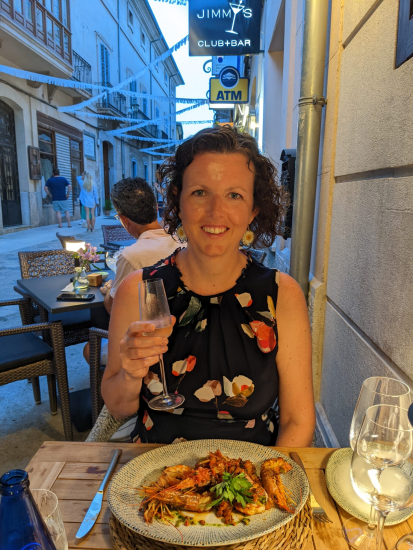20th August 2023 by Jack Allan

I was diagnosed in June 2020, de novo. Absolutely no history or family history of cancer. My Nan was 100 so we have long lives in our family. I was 39, had always checked for lumps and kept an eye on my health. I’d been feeling tired but had a busy life and 2 young kids so attributed it to that until my 2-year-old leaned back on me one day, and I felt a strong pain. I quickly checked myself and found a lump, was able to get a GP appointment despite Covid times but assumed it would be a cyst as I have PCOS. During my check-up, the nurse flagged to me quite quickly that she didn’t think this was just a cyst and could be cancer and that was helpful.
Assumed that by catching it early all would be ok, but I could feel it growing very quickly from that point. We did all the scans and found that I had secondary cancer. This really rocked my world, and it was hard to digest, particularly with two young kids.
I was put onto chemo quickly which was hard going physically but I also felt Covid made my nerves worse too. I was worried to be near people in case I got ill, and it made my family anxious about seeing me too.
It’s been 3 years since my diagnosis, but things have changed a lot. I feel strongly about calling it living with SBC because it is something I live with daily.
There has been no progress with my cancer since starting my current course of drugs in Dec 2020 which is great.
I have been able to play netball again and exercise really helps. Getting back to work has been good too.
It felt like there was very little support from NHS nurses and my oncologist on the subject of secondary breast cancer.
I didn’t really seek a lot of information or support, to begin with – I felt like the NHS wasn’t a reliable source. The conversations were very medical only with no advice on wellbeing, mental health, eating and exercise.
The mental load is the biggest struggle at times and there was nothing in place to support me through this from my initial oncology team. They did not answer with enough information or questions that I had. The support from the community has helped with this.
Initially, I was scared to connect with other groups, tried McMillan but it didn’t help. I was almost in denial about it and felt like making friends in the same position would be worse because I wouldn’t be able to cope with losing them and seeing that outcome for my own future.
After the 2nd lockdown, I was struggling with hormone treatment and home school and it all hit me hard. I sought counselling and considered finding a group to connect with and then found M2C on Facebook.
Once I found the M2C group online, I went along to Future Dreams House and found it helpful to hear other patients' stories and their different paths.
The monthly meetups and advice became really important and relatable to me and when the opportunity arose, I took the lead in hosting these events. It feels great being able to help and guide others.
I feel proud to share my own learnings with other patients, I am a strong positive person so want to share that with others.
It’s crucial to have localised groups – our London group has a lot of people from all over.
Being the host means I provide a familiar face to support and welcome newcomers which feels especially important, given how difficult I found it to allow myself to join support groups to start with.
Family and friends can sometimes avoid the hard topics but at the M2C groups, we celebrate the highs and the lows together.
Hair loss was one of the toughest parts – meant everyone knew and opens the conversation to SBC and it being terminal.
I already knew how strong and positive a person I was, but this has reaffirmed that. I’ve also learned to prioritise the things that really matter, like changing my working days to be able to spend more time with my children.
I’ve learned to balance things better and choose only to do things that are truly a priority. It’s given me clarity on what’s important and I have learned to cancel if an activity will make me feel tired or worse.
It is a difficult journey to travel but having the support of M2C and the community is helpful and will be invaluable.